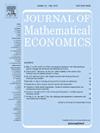在社会环境内和社会环境之间进行辩解,并有可能推迟做出选择
IF 1
4区 经济学
Q3 ECONOMICS
引用次数: 0
摘要
本文提供了一类模型的公理特征,在这类模型中,决策者(以下简称 DM)最大化一个单一的偏好排序,该排序受制于一个取决于基本选择集和社会背景的候选名单。因此,原始数据集是从每个选择集--社会背景对中选择出来的数据集,这个数据集被称为背景。DM 应该从每个情境的候选名单中选择最喜欢的选项。然而,由于存在相互冲突的规范(或规范的不确定性),他/她可能在某些情境中不选择任何选项。因此,与现有的理由模型不同,在我们的框架中,选择推迟是可能的。本文章由计算机程序翻译,如有差异,请以英文原文为准。
Justification within and between social contexts with the possibility of choice deferral
This paper provides axiomatic characterizations for a class of models where a decision maker (henceforth, DM) maximizes a single preference ranking subject to a shortlist that depends on the underlying choice set and social context. Thus, the primitive is a dataset of choices from every choice set – social context pair that is called the context. The DM is supposed to choose the most preferred option from the shortlist of each context. However, due to existence of conflicting norms (or norms uncertainty), he/she might choose no option in some contexts. Therefore, unlike existing justification models, choice deferral is possible in our framework.
求助全文
通过发布文献求助,成功后即可免费获取论文全文。
去求助
来源期刊

Journal of Mathematical Economics
管理科学-数学跨学科应用
CiteScore
1.70
自引率
7.70%
发文量
73
审稿时长
12.5 weeks
期刊介绍:
The primary objective of the Journal is to provide a forum for work in economic theory which expresses economic ideas using formal mathematical reasoning. For work to add to this primary objective, it is not sufficient that the mathematical reasoning be new and correct. The work must have real economic content. The economic ideas must be interesting and important. These ideas may pertain to any field of economics or any school of economic thought.
 求助内容:
求助内容: 应助结果提醒方式:
应助结果提醒方式:


